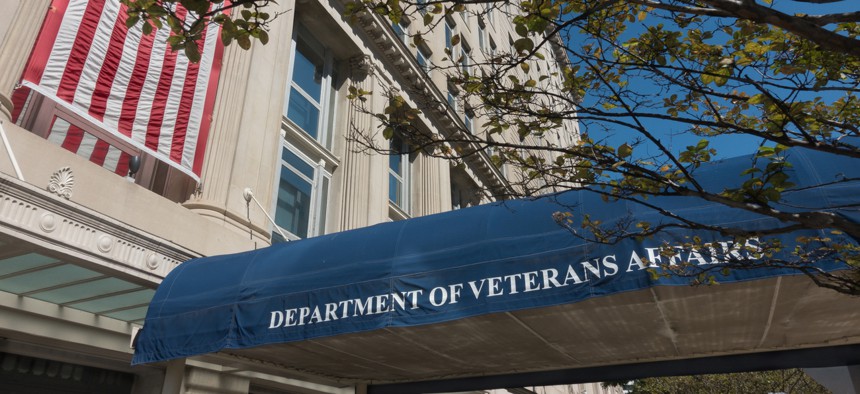
bakdc/Shutterstock.com
VA's Whistleblower Protection Office Again Faces Allegations of Retaliation, Intimidation
New leadership promised changes after previous scathing reports, but employees say little has changed.
The office in the Veterans Affairs Department created to protect whistleblowers is once again facing allegations of retaliating against them, despite assurances from office leadership that it has put those concerns to rest.
VA’s Office of Accountability and Whistleblower Protection, created in 2017, previously came under fire after whistleblowers accused it of engaging in its own whistleblower reprisals while failing to carry out its mission to discipline top executives. The revelations led to a change in leadership, congressional hearings and an inspector general report validating the accusations. The latest allegations stem from an investigation conducted by the Project on Government Oversight and shared with Government Executive, which first revealed details of the original allegations against OAWP last April.
Tamara Bonzanto, confirmed by the Senate in January 2019 as assistant secretary for OAWP, promised the House Veterans Affairs Committee during multiple hearings last year that the issues that plagued her office were in the past and occurred under its original leadership. But 20 current and former OAWP officials told POGO that internal problems are persistent and the office’s employees operate within a culture of fear.
As the IG was conducting its investigation, the employees said, Todd Hunter, then Bonzanto’s deputy, cautioned employees—in front of the assistant secretary—against cooperating with the investigators and said he could have anyone with a workplace issue “gone by this afternoon.” Two OAWP supervisors and the director of investigations told Hunter the next business day they found the comments intimidating and inappropriate and would volunteer to work with the IG. Within a week, one of the supervisors was fired and the director was demoted and reassigned. A termination letter for the supervisor stated the cause of the dismissal was “unacceptable conduct.”
The case is currently under review by the Office of Special Counsel, an independent agency charged with protecting whistleblowers. Hunter now serves as the executive director for VA's business operations center.
Another employee was allegedly harassed after questioning a $2,700 couch Bonzanto purchased for her office. When the office’s chief operating officer raised concerns about the alleged harassment to the assistant secretary’s new deputy, Hansel Cordeiro, employees told POGO that Cordeiro demoted the chief operating officer within a week. The employee facing allegations of harassing the individual who questioned the couch purchase was then promoted to the COO position.
“In two congressional hearings last fall, Bonzanto blamed the current situation on her predecessors,” POGO wrote in its report. “However, POGO’s investigation reveals that Bonzanto’s tenure has not reflected even slow progress in rectifying the previous two years’ problems and has instead made things worse.”
At a hearing last October, Bonzanto acknowledged OAWP must work to regain the trust of whistleblowers, but repeatedly stressed she has implemented key changes to fix some of the office’s most serious issues. She vowed to create a “culture of accountability.” POGO suggested, however, the retaliation still allegedly taking place under Bonzanto’s watch is “prohibited by law and is contrary to the accountability and whistleblower protection office’s mandate.” Instead of improving the culture at OAWP, POGO said, Bonzanto has made it worse.
Due in part to the reassignments and demotions, POGO also found many vacancies persist at OAWP’s top ranks. The acting director of investigations who replaced the reassigned director has since resigned. Employees received standard operating procedures for conducting investigations last year and only were provided standardized training within the last two months. Employees said progress in standardizing the investigatory process was undone, however, when Bonzanto insisted employees expedite the reduction of OAWP’s case backlog. Employees told POGO they felt they were being set up to fail.
Christina Mandreucci, a VA spokesperson, said Bonzanto has worked to improve OAWP and its communications with whistleblowers. She said the office has filled many of its vacancies and, while not addressing specific allegations, noted not all employees were upset with its leadership. “Dr. Bonzanto is committed to fostering an open and positive work environment and addressing any concerns employees may have,” Mandreucci said. “OAWP leadership has also received positive feedback from many employees on various initiatives to address staff concerns.”
Rep. Chris Pappas, chairman of the House VA Committee’s panel on Oversight and Investigations, said he recently meet with OAWP’s leadership for an update on its improvement efforts. “They have significant work ahead to turn the office around, address the culture of retaliation that exists at the VA, and show Congress and whistleblowers that OAWP can be effective,” Pappas said.
Trump created the office by executive order in 2017 and later codified it when he signed the 2017 VA Accountability and Whistleblower Protection Act into law. The office was mostly celebrated, with advocates hopeful that the focus on the rights and protections for whistleblowers would reverse a culture infamous for intimidation and reprisal. That optimism quickly soured, however, leading to hotline tips to the inspector general and bipartisan scrutiny from Congress.
Since the incidents occurred that are now under investigation by OSC, employees said things have worsened.
“Threats, intimidation, and retaliation have continued in the months since, multiple employees told POGO,” the organization said. One current investigator told the watchdog group, “People are terrified.”
This story has been updated with comment from VA and from Rep. Chris Pappas, D-N.H.







